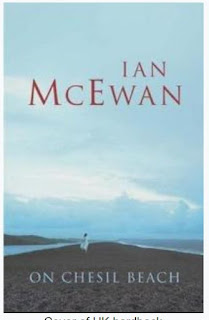On Chesil Beach
Ian McEwan’s micro novel On
Chesil Beach deserves at least a micro review. It is July 1962, and Edward
and Florence are on their honeymoon. More precisely, it is their wedding night,
and the clock is ticking. Edward has been holding out for this moment
throughout the year of their engagement. With typical irony, McEwan writes that
‘Edward’s single most important contribution to the wedding arrangement was to
refrain, for over a week’. During this time, he has been ‘chaste with himself,’ since
he wishes to be ‘in top form for his bride’ (p.20). That is one side of the matter. Whether it is the expected restraint of the times, ignorance, fear or asexuality, Florence is rather the opposite, dreading Edward’s touch
as a wifely duty she would rather not perform at all.
There are five chapters in this short novel, and it isn’t
until the end of Chapter Three that the near consummation sees Florence fleeing
the room and sprinting out into the darkness, down to Chesil Beach where she hides until the husband seeks her out. Chapter Four delays this moment, as
we learn more about their courtship, and in Chapter Five the pair talk, speak harsh words they shouldn’t, and (as Eliot once said) things end not with a
bang, but with a whimper. In the final pages, McEwan takes us forward in time
to Edward in his sixties, looking back and wondering if he missed the love of
his life.
If you have read this far, you have already swallowed the
book, though I would still recommend that you read it. The tension
of a wedding night holds the narrative in place, while the story of the two
characters, their different upbringings and the foreignness of their social
distinctions, gives the novel a subtle sociological quality. Largely the language
is as simple as Edward’s thoughts – though the final page sees McEwan’s increase
in compound sentences as the wiser man reviews his past and the narrator points
out the final ironies of the beach argument:
He did not know, or would not have cared to know, that as she
ran away from him, certain in her distress that she was about to lose him, she
had never loved him more, and that the sound of his voice would have been a
deliverance, and she would have turned back. Instead, he stood in cold and
righteous silence in the summer’s dusk, watching her hurry along the shore, the
sound of her difficult progress lost to the breaking of small waves, until she
was a blurred, receding point against the immense straight road of shingle
gleaming in the pallid light (p.166).
If ignorance is bliss, partial knowledge is misery. Better, indeed, the hellish wedding night endured by Frankenstein when the creature snatches his bride (and sometimes sister) before the deed is done. At least Frankenstein can howl in the thunder and lightning of a Lake Geneva storm. Edward is ‘cold and righteous’, and there is no fun in that – though as McEwan has warned from the first sentence, ‘[t]hey were young, educated, and both virgins on this, their wedding night, and they lived in a time when a conversation about sexual difficulties was plainly impossible’ (p.3).
The summer of love was half
a decade away, and nobody sings about the summer of ’62.
(See also Machines Like Me, Black Dogs, Solar




Comments
Post a Comment